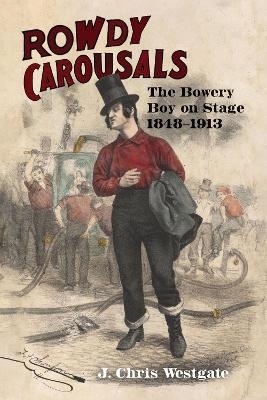
Rowdy Carousals
The Bowery Boy on Stage, 1848-1913
Seiten
2024
University of Iowa Press (Verlag)
978-1-60938-947-5 (ISBN)
University of Iowa Press (Verlag)
978-1-60938-947-5 (ISBN)
Makes important interventions in theatre history regarding the Bowery Boy, a raucous, white, urban character. The book’s examination of working-class whiteness on stage, in the theatre, and in print culture invites historians and critics to check the impulse to downplay or ignore questions about race and ethnicity in discussion of the Bowery Boy.
Rowdy Carousals makes important interventions in nineteenth-century theatre history with regard to the Bowery Boy, a raucous, white, urban character most famously exemplified by Mose from A Glance at New York in 1848. Theatrical representations of the Bowery Boy emphasized the privileges of whiteness against nonwhite workers including enslaved and free African Americans during the Antebellum Period, an articulation of white superiority that continued through the early twentieth century with Jewish, Italian, and Chinese immigrants.
The book’s examination of working-class whiteness on stage, in the theatre, and in print culture invites theatre historians and critics to check the impulse to downplay or ignore questions about race and ethnicity in discussion of the Bowery Boy. J. Chris Westgate further explores links between the Bowery Boy’s rowdyism in the nineteenth century and the resurgence of white supremacy in the early twenty-first century.
Rowdy Carousals makes important interventions in nineteenth-century theatre history with regard to the Bowery Boy, a raucous, white, urban character most famously exemplified by Mose from A Glance at New York in 1848. Theatrical representations of the Bowery Boy emphasized the privileges of whiteness against nonwhite workers including enslaved and free African Americans during the Antebellum Period, an articulation of white superiority that continued through the early twentieth century with Jewish, Italian, and Chinese immigrants.
The book’s examination of working-class whiteness on stage, in the theatre, and in print culture invites theatre historians and critics to check the impulse to downplay or ignore questions about race and ethnicity in discussion of the Bowery Boy. J. Chris Westgate further explores links between the Bowery Boy’s rowdyism in the nineteenth century and the resurgence of white supremacy in the early twenty-first century.
J. Chris Westgate is professor of English at California State University, Fullerton. He is coeditor of Performing the Progressive Era: Immigration, Urban Life, and Nationalism on Stage (Iowa, 2019). He lives in Claremont, California.
| Erscheinungsdatum | 23.08.2024 |
|---|---|
| Reihe/Serie | Studies in Theatre History & Culture |
| Zusatzinfo | 10 b&w images |
| Verlagsort | Iowa |
| Sprache | englisch |
| Maße | 152 x 229 mm |
| Gewicht | 454 g |
| Themenwelt | Literatur ► Lyrik / Dramatik ► Dramatik / Theater |
| Kunst / Musik / Theater ► Musik ► Klassik / Oper / Musical | |
| Kunst / Musik / Theater ► Theater / Ballett | |
| Geschichte ► Teilgebiete der Geschichte ► Kulturgeschichte | |
| Sozialwissenschaften ► Ethnologie | |
| Sozialwissenschaften ► Soziologie | |
| ISBN-10 | 1-60938-947-6 / 1609389476 |
| ISBN-13 | 978-1-60938-947-5 / 9781609389475 |
| Zustand | Neuware |
| Informationen gemäß Produktsicherheitsverordnung (GPSR) | |
| Haben Sie eine Frage zum Produkt? |
Mehr entdecken
aus dem Bereich
aus dem Bereich
der stille Abschied vom bäuerlichen Leben in Deutschland
Buch | Hardcover (2023)
C.H.Beck (Verlag)
CHF 32,15
Die Revolution des Gemeinen Mannes
Buch | Softcover (2024)
C.H.Beck (Verlag)
CHF 16,80


